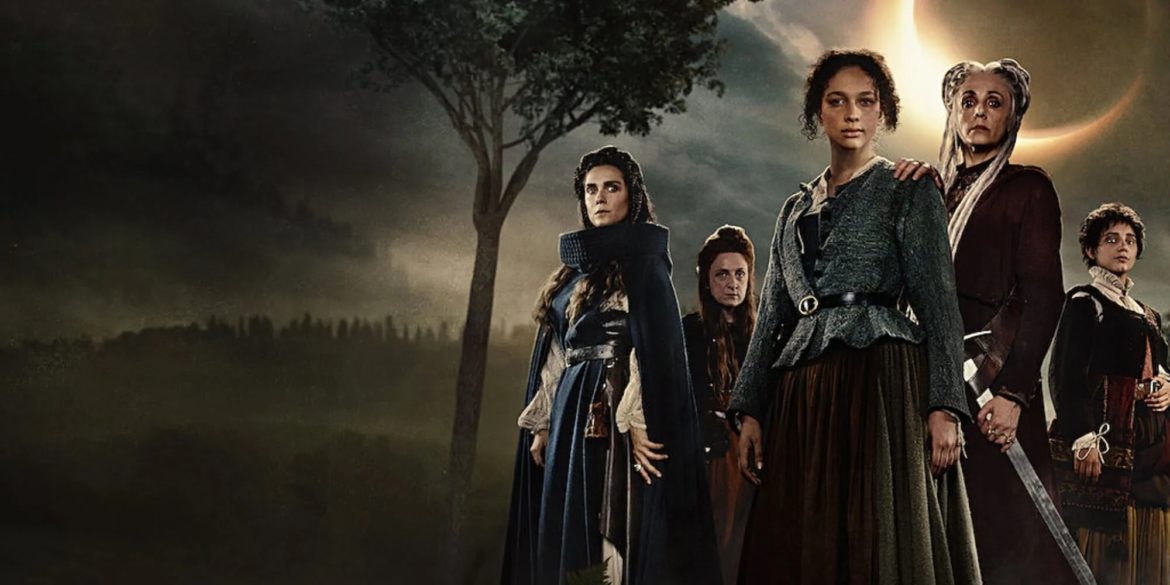
Last week, as part of its new ventures in Italy, Netflix released a new Italian six-episode series called Luna Nera (Black Moon). The series, inspired by the eponymous novel by Tiziana Triana, was filmed in Italy at Cinecittá and the environs of Rome and created by writers Francesca Manieri, Laura Paolucci, and Tiziana Triana. The series is in Italian and masterfully dubbed into English. It was directed by Francesca Comencini, Susanna Nicchiarelli, and Paola Randi.
Luna Nera takes place in 17th Century and follows the plight of Ade (Nina Fotaras) who is accused of Witchcraft within seconds of the series-opening for psychically perceiving the stillbirth of a child while assisting the midwife, her grandmother, during delivery. The beginning moments of the series are captivating as we quickly see both the seriousness of the accusation and the reality that the accusation is accurate. We learn that Ade has a special gift and can assist a coven of witches in their task to free women who suffer under the accusations of Witchcraft.

Luna Nera cast [Courtesy: Netflix]
In the first episode, we are also introduced to the Benandanti, Catholic witch-hunters whose motto is “Il coraggio ci governi, la fede ci arda,” “Courage governs us, faith burns us.” The Benandanti are presented powerful executors of, presumably, the Roman Inquisition. It seems that their presence in the series is to lend some historicity to the series. In reality, the Benandanti were an agrarian group from the Friuli region of Italy who astrally projected while sleeping to fight witches and were later denounced by the Church as a practitioner of heretical arts themselves.
The first episode, indeed the first few minutes, of the series immediately creates sympathy for the witches as underdogs against a powerful patriarchal force. That sympathy is then squandered on the main plotline: a love story between Ade and Pietro (Giorgio Belli), a physician-scientist who returns from Rome and happens to be the son of the woman who lost her baby. Pietro is returning to his mother’s side to help her heal while demanding the Benandanti turn to reason and cease their witch hunts because witches don’t exist.
And therein lies the main problem with Luna Nera. The plot slowly becomes increasingly predictable with the presence of a chosen one and the evolution of the love story and the mundane world.
This is apparently intentional, as noted by Comencini who directed the first two episodes:
There is nothing more magical than reality and nothing more realistic than magic. Witches are strong, rebellious women who don’t step back. A universal figure that is back in fashion, the greatest utopia of our time. Magic shows us a different way of being in the world, with women who do not submit and escape the rules, and even if discriminated against they are not victims.
The series is indeed strong with a feminist understanding of power and relationships. It is a story about resisting the patriarchy and the resurgence of feminine power. But it also recedes from Comencini’s aspirational message by miring itself in developing the romantic relationships between men and women. In fact, and without revealing spoilers, the plot and sub-plots are the consequences of powerful men making decisions over women.

Ade and Pietro [Courtesy: Netflix]
But perhaps what is even more of a serious challenge for the series is that it lacks a sense of grandeur. At least in this season, it never gets too dark and never gets transgressive. The series never gains an epic quality. Rather it stays notably local, even mundane in scale.
Despite the flaws (and inexcusable swordplay), the series was still enjoyable, especially for Italophiles. The screenplay is well written. The backdrop of the series is a tour of some interesting places in the cinematographically enviable countryside just outside of Rome, from Western Lazio through the Maremma of Tuscany. And while the acting is often acceptable, Manuela Mandracchia who plays the coven leader, Tebe, shines brightly during her scenes.
However, if you approach the series with an expectation to gain insights about Stregheria or even Italian folk magic beliefs and practices, you will find the series disappointing. In fact, look elsewhere. In many ways, the practice of Witchcraft is tangential to the story. There are occasional invented aphorisms shared and some even an origin in magical practice, but no serious theology or philosophy of Stregheria. It is a suspicious oversight and possibly even an inappropriate deference to religious disapproval of the open practice of Witchcraft and folk beliefs.
Nevertheless, Luna Nera is a story discussing and describing Witchcraft in a manner that is both similar and yet afield from the more ubiquitous Anglo-Saxon perspective. When Ade meets the coven who gives her refuge, the scene is replete with Pagan imagery that is familiar and yet with a distinctly Southern European accent. The nuances are heard from the Mediterranean herbology down to names like Janara, a likely dialectical name for Diana.
It is this sense, that the series succeeds for those who might look for a Pagan angle. Otherwise, it’s Romeo and Juliet.
The Wild Hunt is not responsible for links to external content.
To join a conversation on this post:
Visit our The Wild Hunt subreddit! Point your favorite browser to https://www.reddit.com/r/The_Wild_Hunt_News/, then click “JOIN”. Make sure to click the bell, too, to be notified of new articles posted to our subreddit.